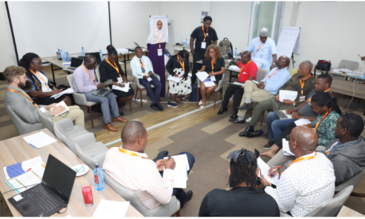
Representatives from National Tuberculosis Programmes (NTPs) in Kenya, Malawi, Nigeria and Uganda gathered for a pivotal roundtable discussion on 4 October 2023, in Machakos, Kenya. The meeting was part of a Training of Trainers (ToT) workshop on evidence-informed decision-making (EIDM), facilitated by the LIGHT Consortium. The gathering served as a catalyst for fostering cross-country collaborations and knowledge exchange among the different NTPs including sharing learnings, insights, experiences and best practices. It enhanced participants’ understanding of effective policies and interventions applicable to their national context and programmes as they collectively strive to end TB across the African continent.
The Global TB Challenge
TB remains a global concern, with over 10 million new cases reported each year, and 1.3 million deaths in 2022, according to the World Health Organization (WHO) Global TB report 2023. Adult men continue to account for the highest share of all TB cases (55%) compared to adult women (33%) and children (12%). Most of the new TB cases are recorded in countries with high burden of TB, HIV-associated TB, and drug-resistant TB, with Kenya, Malawi, Nigeria and Uganda among the most affected. This underscores the pressing need for innovative approaches to effectively address this burden.
When nations come together to share insights, strengths, weaknesses and successes, it paves the way for a more coordinated response to end the disease. The recent roundtable discussion was a testament to this collaborative and commitment towards ending TB.
Sharing of Best Practices
During the gathering, NTP representatives discussed some of the unique challenges each country faces in ending TB, including underreporting, transportation hurdles, bureaucracy, bottlenecks within the health care system, and the persistent stigma associated with the disease. Participants openly shared their experiences and suggested solutions to overcome these obstacles. Discussions revolved around integrating EIDM into NTP programmes, strengthening early detection, engaging communities and raising awareness, leveraging innovative technologies and adopting patient-centred care.
EIDM is an approach that enables decision-makers to effectively engage and apply the best-available research findings in the design of policies and implementation of programmes. NTP representatives discussed how this approach could be incorporated into their national TB programmes. The workshop focused on the institutionalisation of EIDM within NTPs through a comprehensive “training of trainers” programme covering evidence assessment, appraisal, synthesis and application strategies.
Participants also discussedstrengthening early detection of TB as a crucial approach for prognosis and effective treatment. They shared their TB prevention and care strategies and innovations to improve early diagnosis, with an emphasis on decentralising TB services and implementing a community-based approach. This would enable a centralised and easier access to care, while ensuring that NTP effectively monitors adherence and successful completion of TB treatment. Data management emerged as a fundamental tool for recording and monitoring people with TB.
Participants acknowledged that effective TB management extends beyond medical interventions and necessitates close collaboration with communities through community engagement, awareness and education. Initiatives dedicated to raising awareness and dispelling misconceptions about TB, such as Uganda’s biannual “Community Awareness, Screening, Testing, prevention, and Treatment to End TB” (CAST-TB) campaign and Nigeria’s annual National TB Week, played pivotal roles in supporting mass testing for TB, leading to greater case identifications.
The discussion further touched on the use of innovative technologies, such as GeneXpert machines for TB detection, to expedite the diagnosis and treatment processes. However, NTP representatives emphasised the need for scaling up training for laboratory specialists to improve efficiency and reduce wastage of resources including machine’s cartilages. Additionally, they recommended stronger collaborations with private hospitals and laboratories to reduce testing times and ensure patients are swiftly placed on treatment regimens.
The need for patient-centred care was another emerging theme during the discussions. NTP representatives emphasised the importance of treating each patient as an individual with distinct needs and challenges. Notably, discussions recognised the gender disparity in TB, with more men falling ill with the disease, and underscored the need for targeted interventions, such as screening men at their workplaces, to reach men more effectively.
Cultivating Relationships and Building Networks
This roundtable discussion among TB programme representatives, facilitated by the LIGHT Consortium, highlights the invaluable insights and best practices these engagements foster, and underscores the need for initiating additional platforms for such exchanges. Key learnings from this dialogue will likely shape more effective TB programmes in the coming months and years. Therefore, proactively seeking opportunities to amplify such interactions need to be prioritised due to their vital role in cross-country sharing of good practices and lessons learned as well as strengthening existing TB programmes.
